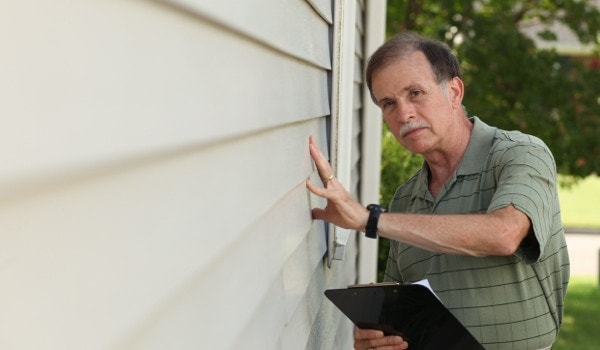The Essential Guide to Buying a Home for the First Time
Posted
on December 1, 2020

Buying a new home can be a challenge for anyone, but especially for first-time homebuyers. It’s likely the biggest purchase you’ll ever make. You’ve spent years saving up for this moment.
Now it’s time to make sure your investment pays off. Follow this guide to ensure that the process of buying your first home goes off without a hitch.

1. Get your finances in order.
When you buy a home, you’re not the only one making a commitment — the bank is committing to front the rest of the money for your homeownership dreams. So they want to make sure you’re a good investment.
To ensure you are in the best financial position to secure a home loan, take these steps:
- Save up for a down payment. Some mortgage loans require as little as 3% down. At minimum, you want to have that much saved.
- Strengthen your credit score. Keep a healthy credit report — you can check it at www.annualcreditreport.com. Pay everything on-time and in full to avoid new issues that can sink your score.
- Set a realistic budget. Take into account all of your monthly expenses to see how much home you can afford. Run your numbers through a mortgage calculator to determine your down payment and see how much your monthly payments will be. While you may technically be able to afford something, that doesn’t necessarily mean it will fit nicely into your monthly budget with room for expenses and leisure spending.
- Get approved for a mortgage. Start with your current bank, then shop around for other rates. You may be able to get pre-approved based on your credit.
- Explore your options as a first-time homebuyer. There are a variety of different programs and loans specifically designed to help first-time home buyers purchase a new home. See if your state, city, neighborhood or bank offers options for you.
- Set aside money for moving and closing costs. There are other expenses involved in purchasing a new home beyond the down payment. Plan for those so you have enough cash to close the deal and get settled.
2. Prioritize your must-haves.
Once you start looking at new homes , you’ll find that getting all of the features you love may cost a little extra. Make a list of everything you need, like the number of bedrooms or a fenced-in yard for your pet to roam. Give that list to your real estate agent so they can line up homes that meet your needs. If you’re doing some online browsing yourself, keep that list handy so that you can filter results and find suitable homes without compromising on what you must have. Remember, everyone’s “essential purchase” for a new home can be different, so update your list of wants as you learn more about what's on the market. In addition to the basics like square footage and number of bathrooms, consider some commonly overlooked must-haves like location, storage space, kitchen layout or the amount of natural light.
Homes are defined by their architectural styles. As a first-time homebuyer, you may know what you like when you see it, but lack the knowledge on all the different home styles and their benefits.
Maybe you like the minimalism of modern style. Or you're drawn to the artisanship of Craftsman homes. Architectural styles blend, borrow and build off each other, but each possess their own unique characteristics. Explore the neighborhoods you love and take note of what you like most about the homes. Do your homework to see the history of that style and learn about other types of homes that share architectural elements.
Neighborhoods and new developments are often restricted in the style or styles of homes. By knowing what you like, you know exactly where to focus your search. On the flip side, if you really love a particular area, you can make sure the homes there hit your must-haves — even if they look a little different than you expected.
Figuring out your style can also help if you’re looking for a fixer-upper. Homeowners customize their houses over the years. You might realize that a house that isn’t as eye-catching is actually hiding everything you’re looking for underneath the aesthetic changes.
4. Make every open house matter.
During a house hunt, you may end up visiting more houses than you ever imagined. Admittedly, this is one of the best ways to get started buying a house. That said, avoid falling into the trap of quantity over quality. Make the time in each house count.
Pay attention to the details and take notes — it can be hard to remember what you liked or didn’t like when you’re exploring multiple homes. Ask plenty of questions to learn when things were updated, when windows were replaced or who finished the home improvements. You can learn a lot about the home’s condition and history — and spot any red flags.

5. Hire a qualified home inspector.
After you’ve picked out your home, you need to make sure it has good bones. Inspection is an essential step in any guide to buying your first home. This is because while new constructions undergo several rounds of inspection to ensure work is done properly along the way, an older home may not have had an inspection since it was built. It’s not just the health of the house that can change in that time. Building codes can also change to adhere to new safety standards.
You need someone who can thoroughly assess every part of the house and give you assurances that you’re making a good investment. A home inspector examines all the areas of a house that can cause problems and impact the price, from structural integrity to the efficiency of the windows. A home inspection may even be a requirement by law or by the terms of your mortgage.
6. Close the deal.
If you’ve followed all these steps in this first-time homebuyer’s guide, you’ll be much more prepared to negotiate a fair deal. By this point in the process, of course, you’ll no longer be a first-timer. You will have become a seasoned home shopper who knows what they want and what they can afford. You might even know more about your potential new home than the current owners!
Leverage this information in your negotiation to make a competitive offer or get a great deal on your first home. Everything is negotiable. If a home inspection finds repairs are needed, you can have the seller address those or knock down the price. You might be able to get them to pay for the inspection itself, chip in on closing costs or provide a warranty to ensure any issues that arise in the first year are covered.
All that’s left is to seal the deal, sign the papers and move into your first home!
Schedule a free consultation to find windows and doors for your home.
